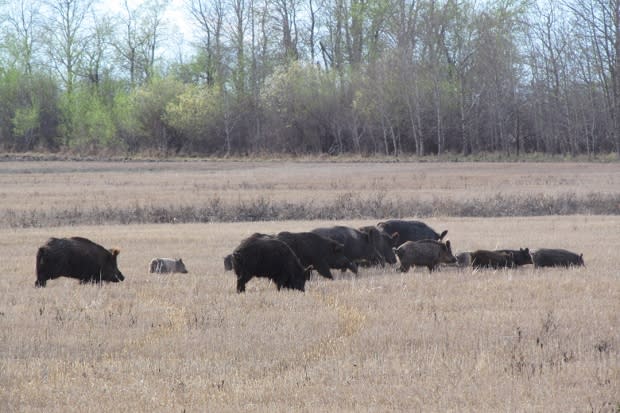Wild pigs causing 'ecological disaster' as they spread rapidly across Canada, survey says
For the first time, researchers have mapped the range of wild pigs across Canada and found the invasive swine are expanding at a rapid rate.
Wild pigs are now Canada's most prolific invasive mammal, according to what the University of Saskatchewan calls the first-ever published survey of their distribution in Canada — and they're causing an "ecological disaster."
"They'll root up the vegetation like a rototiller," said researcher Ruth Aschim. "They're rolling around in the water, defecating in it."
"There is crop damage, disease transmission, even automobile crashes with these pigs."
The wild pigs are the legacy of a failed attempt to diversify meat production with wild boars.
The porcine pests were imported from Europe in the 1980s and 1990s for livestock or "penned game" for hunters.
Many boars escaped their pens and mated with pigs, said Aschim, and they're now causing damage wherever they go.

The wild pigs are rooting and wallowing from B.C. to Quebec.
While most are in the Prairies, there are pockets in Ontario, Quebec, northeastern B.C., the B.C. Interior, and possibly even the Vancouver suburb of Langley.
Only Atlantic Canada and the territories lack populations.
Come out at night
They currently range over more than 750,000 square kilometres — an area larger than Chile — and their territory has increased by 88,000 square kilometres per year, on average, over the past decade, researchers found.
"The public is not overly aware of the wild pig problem, because they are elusive and nocturnal," Aschim said.
Researchers say wild pigs are very hard to eradicate.
They grow as big as 115 kilograms (250 pounds), can eat almost anything, become sexually mature in four to eight months and have about six piglets in a litter.
Researchers add they're hardy in the winter as well, burrowing into "pigloos" in the snow.
The survey, published last week in Nature Scientific Reports, warns that wild pig populations and range will "continue to expand exponentially" over the next decade at least, if aggressive management policies are not implemented soon.


